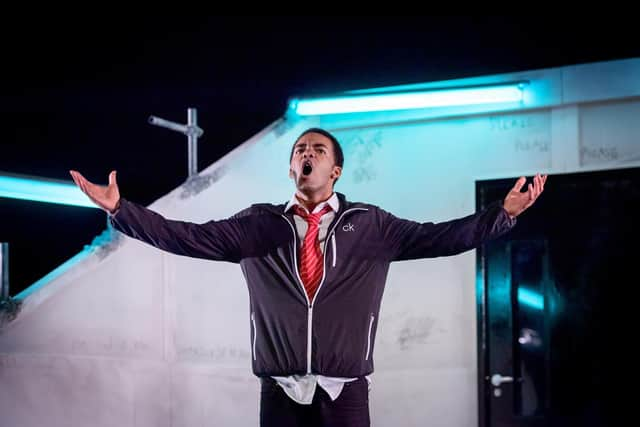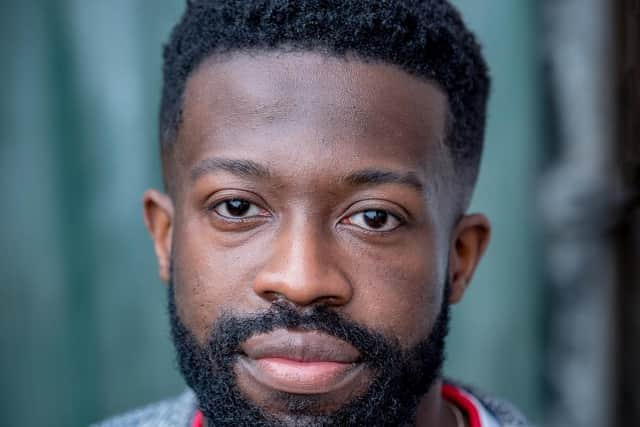Red Ladder’s latest show is a powerful piece of new writing by debut playwright Nana-Kofi Kufuor
Sometimes it needs to be serious. Sometimes theatre is genuinely important and has resonances felt far outside the walls of the buildings in which it happens.
My Voice Was Heard But It Was Ignored belongs firmly in this category.
Advertisement
Hide AdAdvertisement
Hide AdThe stage debut of writer Nana-Kofi Kufuor, the play is an interrogation of black identity for which he has drawn on his own experience growing up in Stockport with Ghanaian parents and working in education with young people from a range of backgrounds.


“The crux of this play is how two people react to the same situation. They go on a journey, a journey a lot of people of colour go on, a realisation that where you are now isn’t necessarily where you come from,” Kofi explains.
The play opens with 15-year-old Reece played by Jelani D’Aguilar being roughly accosted by police. His young, black teacher Gillian played by Misha Duncan-Barry witnesses the events unfold, but doesn’t question or intervene as the disturbing scene plays out.
The consequences of her lack of action erupt the following day when Gillian finds herself locked in a classroom with Reece.
Advertisement
Hide AdAdvertisement
Hide AdProduced by Leeds-based Red Ladder Theatre Company, that the play is happening now is a key part of the reason it feels already like a vital piece of work.


In a world post the murder of George Floyd and the global Black Lives Matter protests it sparked, voices like Kufuor’s are important to hear and to have on our stages.
He says: “The play was written mostly before BLM, and I didn’t include any BLM themes in the sense BLM is not mentioned. BLM is now here to stay, and I feel the character Reece is the embodiment of that without ever mentioning it.
“I didn’t want this piece to be reacting to anything; it’s much more a day-to-day thing. Like, the issues that occur are day to day for these characters as opposed to BLM brought them to the surface.”
Advertisement
Hide AdAdvertisement
Hide AdIt sounds like the kind of serious, big-themed kind of drama that we’re used to seeing from the likes of David Mamet. It’s a bold statement for a first play.
“I feel like my play is more of a conversation piece, which might seem like a strange thing to say but for me it starts conversations,” says the playwright.
“I feel like this piece is really about context and how it makes you feel. Will you feel different as a black man to a black woman and to a white man to a black woman etc and where are the intersections?
“I wanted people to understand how other people felt and how we all have different perspectives. I also wanted to really delve into the idea of black individualism and for some black people who do not feel intrinsically linked to any black community.”
Advertisement
Hide AdAdvertisement
Hide AdKufuor’s story is rooted in real-life experience. He was working at a Pupil Referral Unit when one student took a knife and was planning on stabbing a fellow student. Kufuor took the pupil to the canteen and was able to mollify the situation, but when the police arrested the aggressor, he blamed Kufuor.
“I saw him a few weeks later, and he asked why I didn’t help him? That rush of guilt changed to anger and quickly to sympathy as he saw me as his protector. But I knew I couldn’t do anything.”
Leeds-based director Dermot Daly says: “I was really taken by the conceit and breadth of themes and ideas. Thematically it’s huge, but ostensibly it’s about the meaning and creation of identity which is something that affects us all. Neither character is who they want to be, but both appear to be trapped, robbed of agency, this perception in them and hopefully of the audience shifts quite dramatically as we progress. Worry not, there are a few gags in there.”
The play was due to tour last year, but we all know what happened. Kufuor says to finally have the play touring “feels very strange but in a good way”.
Advertisement
Hide AdAdvertisement
Hide AdHe says: “I am honestly extremely nervous as the only two performances of this play were an early script-in-hand at Home (in Manchester). This was part of the Playbox scheme with A Box Of Tricks who commissioned me to write this. Then at Leeds Playhouse for a dress rehearsal, then we went into lockdown. I’m effectively learning on the job.
“I avoided rewriting anything or adding in the pandemic as I did not want this to be a reactionary piece and I felt adding in pandemic-like elements would dilute the story.”
Red Ladder has been producing new writing by voices whose work is often unheard for five decades. Whilst its work tours nationally its roots are in Yorkshire where it has curated
a circuit of non-theatre spaces such as working men’s clubs, sports and social and community hubs.
Advertisement
Hide AdAdvertisement
Hide Ad“I think theatre is definitely one of the places for these type of conversations,” says Kufuor. “On the whole theatres and theatre spaces are relatively liberal but that does not necessarily show in the casting or the writers or the people working in them. I think these conversations had in safe spaces like this question a lot of things and question why theatre looks so inclusive but isn’t as inclusive as we think.
“I want to provoke conversation and dialogue and if you love it great and if you hate it, also great. I want the audience to think and then on the way home question each other’s perspectives and find out new things about one another and themselves.”
Life-changing events played out
My Voice Was Heard But It Was Ignored: When 15-year-old Reece is accosted by the police outside M&S, his young, black teacher Gillian see it all – but she doesn’t intervene as she fears for her own safety. The consequences of her inaction erupt the next day whe she finds herself locked in a classroom with her angry student. The events that unfold will change both their lives forever.
At Leeds Playhouse, November 11-13, Cast, Doncaster, November 23, Pocklington Arts Centre, November 25, Sheffield Crucible, November 29 and 30.
Tickets and details www.redladder.co.uk
